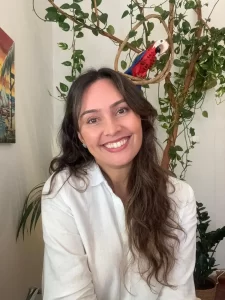14 ways to say "thank you" in Portuguese
😎➡️ Na nossa aula de hoje, vamos aprender outras maneiras divertidas e importantes de dizer “obrigado(a)” como um falante nativo brasileiro. Vamos mergulhar nas expressões educadas na língua portuguesa!
(In today’s lesson, we’re going to learn other fun and important ways to say ‘thank you’ in Brazilian Portuguese and speak like a native speakers. Let’s immerse ourselves in polite expressions in the Portuguese language!)
Neutro e padrão (Neutral and standard)
1. Obrigado(a) (Thank you)
2. Muito obrigado(a) (Thank you very much)
3. Muitíssimo obrigado(a) (Thank you so much)
4. Obrigado(a) por tudo (Thank you for everything)
Jeito Formal (the formal way of saying thank you in Portuguese)
5. Agradeço (I thank you)
6. Agradeço de coração (I thank you from the bottom of my heart)
7. Eu que agradeço (I am the one who thanks you)
8. Fico muito grato(a) (I am very grateful)
Jeito Informal (the informal way of saying thank you in Portuguese)
9. Brigado(a) (Thanks)
10. Brigadão (Thanks a lot)
11. Nem sei como agradecer (I don’t even know how to thank you)
12. Valeu (Thanks)
Expressões cristalizadas para dizer obrigado(a) (Set expressions for say thank you)
13. Deus te pague (God bless you)
14. Fico te devendo essa (I owe you one)
Obrigado vs Obrigada (Thank you)
Observação! (Note!)
Em português, vamos fazer concordância de gênero com as palavras “obrigado x obrigada” do ponto de vista da pessoa que fala “obrigado(a)”. (In Portuguese, we use gender agreement with the words ‘obrigado’ and “obrigada” from the point of view of the person saying ‘obrigado(a)’.)
Em outras palavras: (In other words:)
Obrigado: A pessoa que agradece: homem, menino, ou pessoa que se identifica com o gênero masculino, diz “obrigado” (ou muito obrigado, muitíssimo obrigado, grato etc.). (Thank you: The person giving thanks: a man, boy, or person who identifies with the male gender, says ‘thank you’: (or thank you very much, thank you so much, grateful, etc.)
Obrigada: A pessoa que agradece: mulher, menina, ou pessoa que se identifica com o gênero feminino, diz “obrigada” (ou muito obrigada, muitíssimo obrigada, grata etc.). (Thank you: The person giving thanks: woman, girl, or person who identifies with the female gender, says ‘thank you’ (or thank you very much, thank you so much, grateful, etc.)
Vamos ver alguns exemplos práticos dos muitos jeitos de dizer “obrigado(a)” em português: (Let’s look at some practical examples of the many ways to say ‘thank you’ in Portuguese:)
Practical Examples of Express Gratitude
1. Situação (Situation)
→ Reunião de trabalho (e-mail) (Formal business meeting (email))
Agradecimento Sugerido (Suggested thanks)
→ Agradeço a sua colaboração. / Fico muito grato(a) pela sua atenção. (Thank you for your cooperation. / I’m very grateful for your attention.)
Nível de formalidade (Level of formality)
→ Formal, profissional, elegante. (Formal, professional, elegant.)
2. Situação (Situation)
→ Receber um presente (Receive a gift)
Agradecimento Sugerido (Suggested thanks)
→ Muito obrigado(a)! (Thank you very much!)
Nível de formalidade (Level of formality)
→ Pronúncia oral e informal do português brasileiro. (Oral and informal pronunciation of Brazilian Portuguese.)
3. Situação (Situation)
→ O recepcionista de um hotel (The hotel receptionist)
Agradecimento Sugerido (Suggested thanks)
→ Muitíssimo obrigado(a)! / Nem sei como agradecer! / Fico te devendo essa! (Thank you!)
Nível de formalidade (Level of formality)
→ Neutro, rápido, educado. (Neutral, quick, polite.)
4. Situação (Situation)
→ Intensificar a forma de agradecer. (Intensify the way you express gratitude.)
Agradecimento Sugerido (Suggested thanks)
→ Muitíssimo obrigado(a)! / Nem sei como agradecer! / Fico te devendo essa! (Thank you so much! / I don’t even know how to thank you! / I owe you one!)
Nível de formalidade (Level of formality)
→ Muita gratidão, informalidade – gírias e expressões com emoção. (Much gratitude, informality – slang and expressions with emotion.)
5. Situação (Situation)
→ Pronúncia oral, muito comum eliminar a vogal “o” no início da palavra (Oral pronunciation, very common to omit the vowel ‘o’ at the beginning of the word)
Agradecimento Sugerido (Suggested thanks)
→ Brigado(a)! (Thank you or Thanks!)
Nível de formalidade (Level of formality)
→ Padrão, cordial, demonstra satisfação. (Standard, cordial, shows satisfaction.)
6. Situação (Situation)
→ Uma pessoa idosa pode dizer mais facilmente a expressão cristalizada de raíz religiosa. (An elderly person can more easily say the crystallised expression of religious origin.)
Agradecimento Sugerido (Suggested thanks)
→ Obrigado(a), Deus te pague. (Thank you, God bless you.)
Nível de formalidade (Level of formality)
→ Demonstra gratidão e respeito, adicionando uma bênção cristã comum. (Show gratitude and respect by adding a common Christian blessing.)
Non-verbal language to say ‘thank you’ in Brazil
Linguagem Não-Verbal para dizer “obrigado ou obrigada” no Brasil
A forma como nós brasileiros dizemos “obrigado(a)” é tão importante quanto a própria palavra. (The way we Brazilians say ‘thank you’ is as important as the word itself.)
A Entonação (o tom de voz) e os Gestos (a linguagem corporal) adicionam camadas de significado que podem mudar completamente a mensagem. (Intonation (tone of voice) and gestures (body language) add layers of meaning that can completely change the message.)
1. Intonation in Portuguese: Intensification, Softening, Reduction
Entonação em português: Intensificação, Suavização, Redução
O tom de voz, o prolongamento de algumas vogais, a entonação alta/aguda refletem o nível de gratidão (the tone of voice, the prolongation of some vowels, and high/sharp intonation reflect the level of gratitude.)
Vamos ver alguns exemplos: (Let’s look at some examples)
1. Entonação/expressão – Exemplo 1: (Intonation/expression)
→ Obrigado/a! (Thank you!)
→ Neutro, firme, com a última sílaba levemente prolongada. (Neutral, firm, with the last syllable slightly prolonged.)
→ Educado e cordial. (Polite and friendly.)
2. Entonação/expressão – Exemplo 2: (Intonation/expression)
→ Muiiiiito obrigado/a! (Thank you very much!)
→ Entonação alta/aguda, alongando a vogal nasal [ĩ] da palavra “muito”. (High/sharp intonation, lengthening the nasal vowel [ĩ] in the word ‘muito’ (very).)
→ Demonstra que foi um grande favor ou que foi muito apreciado, por exemplo. (It shows that it was a great favour or that it was greatly appreciated, for example.)
2. Gestures and Body Language in Brazilian Portuguese
Gestos e Linguagem Corporal no português brasileiro
Nós falantes de português brasileiro frequentemente usamos gestos/toques para reforçar ou suavizar o agradecimento: (We Brazilian Portuguese speakers often use gestures/touches to reinforce or soften our thanks:)
Por exemplo: (For exemple:)
Reinforcing Gratitude (who says ‘Thank you’):
Reforçando o Agradecimento (quem diz “Obrigado/a”):
Toque no braço: é comum um brasileiro ao falar, tocar nas pessoas que ele tenha intimidade ou que nunca tenha visto antes. E essa situação também acontece muitas vezes quando um(a) brasileiro(a) diz “obrigado(a)” ou pede desculpas. (Touching the arm: It is common for Brazilians to touch people they are close to or have never met before when speaking. This also often happens when a Brazilian says ‘thank you’ or apologises.)
Perfeito!!! (Perfect!!!)
Se você quer melhorar seu português brasileiro, entender a conjugação dos verbos em português e ganhar mais confiança para se comunicar com falantes nativos…
(If you want to improve your Brazilian Portuguese, master Portuguese verb conjugation, and speak more confidently with native speakers…)

(We have a Portuguese workbook filled with grammar, vocabulary, and Portuguese verb conjugation exercises — perfect for those just starting to learn Portuguese.)
Clique no botão abaixo para saber mais:
(Click the button below to find out more and continue learning how to conjugate Portuguese verbs — including irregular verbs and the infinitive form.)

Confira esses outros artigos do blog relacionados aos verbos em português: (Check out these related posts on Portuguese verb conjugation and grammar!)
How do you say thank you in Portuguese?
In Brazilian Portuguese, ‘thank you’ can be translated as ‘obrigado(a)’. There are other ways to say thank you in Brazilian Portuguese, such as: “valeu” (Thanks) (informal) and “Fico muito grato” (I am very grateful) (formal).
How do you say thank you in portuguese to a woman or a man?
In Portuguese, we use gender agreement with the words ‘obrigado’ and “obrigada” from the point of view of the person saying ‘obrigado(a)’.
In other words: Obrigado/Thank you: The person giving thanks: a man, boy, or person who identifies with the male gender, says ‘thank you’: (or thank you very much, thank you so much, grateful, etc.)
Obrigada/Thank you: The person giving thanks: woman, girl, or person who identifies with the female gender, says ‘thank you’ (or thank you very much, thank you so much, grateful, etc.)









